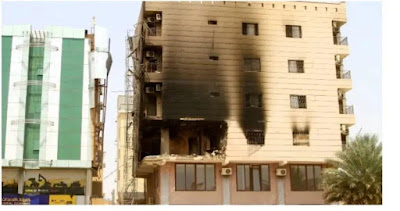Sudan Conflict: Six Things We Know About The Situation Of Stranded Nigerians
With deaths now well over 300 and hundreds injured, Sudan’s crisis is deepening and fears are heightened especially as regards the fate of many Nigerians trapped in the country.
The incarnate desires of two rival generals, army chief Abdel Fattah al-Burhan and his deputy, Mohamed Hamdan Daglo, commander of the large and heavily armed paramilitary Rapid Support Forces (RSF), have set the nation on fire, in a conflict that threatens to engulf all who are involved.
Both the capital Khartoum and other cities across Sudan have experienced great violence with deafening explosions, air strikes, artillery fire, and intense gunfire, especially in densely packed neighbourhoods.
Their jostle for power seems to know no holds barred. Each general has accused the other of starting the fight, and both have made claims they control key sites, which could not be independently verified.
While the two elephants battle, the grasses are suffering and there are fears that the land might be utterly destroyed, with many innocents killed alongside.
Some of those innocents at the brink of death are foreigners including Nigerians, most of which know nothing of this conflict and have taken no sides, however, they face the danger of being killed by forces from either side.
Very concerning at this moment for Nigeria, is the plight of her citizens, most of who are students trapped in Sudan.
Many reports have been given as regards the whereabouts of these individuals, however, here are six things we know so far.
1. Around 5,000 Nigerians could be looking for evacuation
Authorities on Monday said there is a likelihood that a total of around 5,000 Nigerian nationals could be looking for evacuation.
2. FG Plans to start evacuating 3000 by convoy to Egypt
A top government official said Nigeria plans to start evacuating nearly 3,000 of its nationals, mostly students, from Sudan by convoy to Egypt this week.
Onimode Bandele, special duties director for Nigeria’s National Emergency Management Agency (NEMA), told Channels TV the plan was to move about 2,650 to 2,800, including families of embassy staff.




Comments
Post a Comment